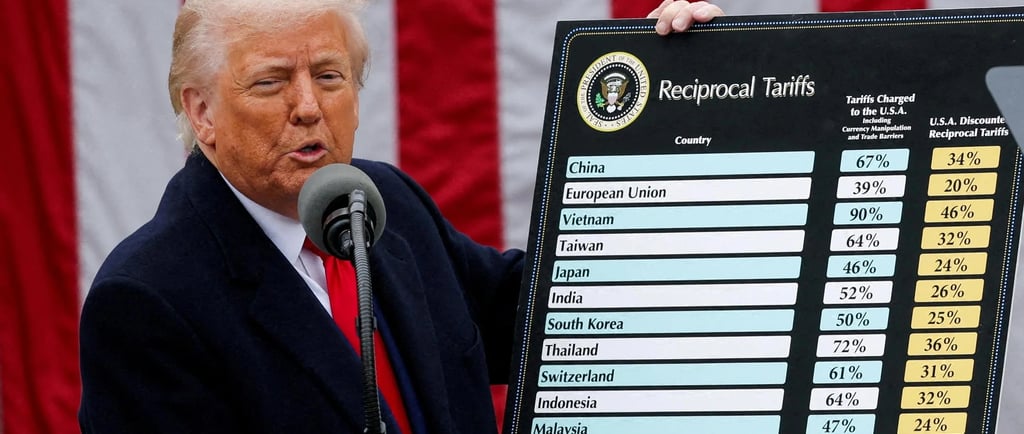South Africa's Economy Under Pressure: Projecting the Impact of Renewed US Tariffs
Dr. Norhan Abdel Rahman Lecturer Of Economics’ – SVA
11/6/20253 min read


A potential storm is gathering over the US-Africa trade relationship, and Southern Africa, particularly the economic powerhouse of South Africa, is directly in its path. Imagine a scenario unfolding in 2025: a new US administration, focused on an "America First" trade policy, imposes a sweeping set of tariffs on African goods.
This isn't just a minor policy tweak; it's a potential economic earthquake. With proposed "reciprocal" tariffs as high as 30-50% on key products, this move would threaten to dismantle decades of progress and force a strategic reshaping of African trade. While this scenario is projected, its implications are so profound that they demand immediate attention.
The Economic Shockwave: Bracing for Impact
The proposed tariffs would create a damaging economic shockwave, with both direct hits and dangerous indirect repercussions for the region.
The Direct Hit: Key Sectors Under Fire
The primary casualty would be the African Growth and Opportunity Act (AGOA), the landmark trade pact that has provided duty-free access for African goods to the US market since 2000. This pact has been a cornerstone of US-Africa trade, helping African exports to the US flourish to $40 billion by 2024. New tariffs would effectively neutralize AGOA, with severe consequences:
Exports Would Plummet: African goods would become significantly more expensive in the US, leading to a sharp decline in competitiveness and a collapse in exports.
Inflation Would Rise: Tariffs are a tax on imported goods. This would drive up the cost of everything from consumer products to industrial components, fueling inflation at home.
Key Industries Threatened: High-tech sectors, like South Africa's world-class automotive industry, would be particularly vulnerable. This industry relies on global supply chains and access to international markets. Tariffs could turn a cost-effective manufacturing hub into an unprofitable one overnight, threatening foreign investment and thousands of jobs.
Supply Chains Rerouted: Global companies that have invested in Southern Africa to tap into US demand would be forced to restructure their supply chains, potentially leading to a wave of de-investment from the region.
The Ripple Effect: Geopolitical Fallout
The impact wouldn't be contained to direct trade. The tariffs would also create significant geopolitical turbulence:
Heightened US-China Tensions: The move would likely intensify the trade war between the US and China, placing African nations in a difficult position. While the US adopts a protectionist stance, China has been actively encouraging trade, recently eliminating tariffs on products from 33 African countries.
Exposing Economic Vulnerability: The trade shock would starkly highlight South Africa's economic vulnerability and its reliance on a few major partners, like the European Union. A sudden disruption with the US could have a domino effect on the country's overall economic stability.
A Forced Pivot: The Silver Lining in the Storm
While the challenges are immense, a trade crisis of this magnitude would also act as a powerful catalyst for strategic change. Faced with a hostile US market, African nations would be forced to accelerate two critical, long-overdue shifts.
1. A Scramble for New Partners
The most immediate response would be a concerted effort to diversify trade partners. African nations would have no choice but to aggressively seek out new markets in Asia, the Middle East, and Latin America. This would also necessitate a unified African diplomatic push to negotiate with Washington for a renewal of AGOA or its replacement with more durable, bilateral agreements.
2. The Real Wake-Up Call: Activating the AfCFTA
More importantly, the tariffs would provide a powerful, unavoidable impetus for the full implementation of the African Continental Free Trade Area (AfCFTA). Launched in 2021, the AfCFTA aims to create the world's largest single market, and its activation is the continent's best defense against external shocks.
A thriving intra-African market would:
Protect African value chains from foreign tariffs.
Stimulate local manufacturing and reduce reliance on imports.
Create a more resilient and integrated continental economy.
However, this requires moving from policy to action. African nations must urgently invest in regional infrastructure, streamline customs procedures, and eliminate the stubborn non-tariff barriers that still hinder trade between neighbors.
Conclusion: A Critical Juncture for Africa
The prospect of new US tariffs in 2025 represents a fundamental threat to the economic stability of Southern Africa. It would erase decades of progress and expose the vulnerabilities of an export model dependent on preferential treatment from the West.
But within this threat lies a historic opportunity. This crisis could be the very catalyst needed to force a strategic reshaping of African economic policy—a shift away from external dependency and toward greater self-reliance. By finally and fully activating the AfCFTA, Africa can turn a potential disaster into a defining moment, forging a more integrated, resilient, and prosperous future, on its own terms.
Download the full study here.
Empowerment
Amplifying African voices for sustainable progress together.
Contact US
Growth
Street No. 3281, N'Djamena, Republic of Chad.
© 2024. All rights reserved.